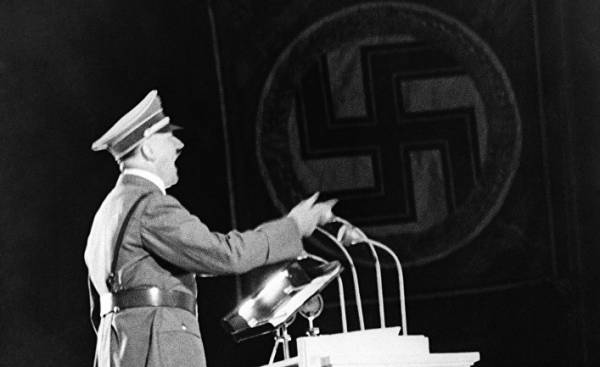
Democracy sometimes brings strange results. For example, two-thirds of voters have voted in fact for a foreign dictator who neutralized the opposition in his country and conquered all media. This is despite the fact that they live in a functioning state of law and must not fear pressure from the government.
This refers not to the result of the referendum on a new Constitution for Turkey, which according to official data, voted 63% of the Turkish voters in Germany. Rather, we are talking about the parliamentary elections in the Czechoslovak Republic, which was held on 19 may 1935. 68% of the Sudeten Germans, the German residents, primarily Czech border regions with Germany and Austria, voted then for codeto-German party (SDP) led by Konrad Henlein (Henlein Konrad).
PSD was essentially a foreign organization of the Nazi party of Adolf Hitler. It is indirectly funded by the German government through the organization of the Volksbund für das Deutschtum im Ausland. In the interests of Hitler was part of the destabilization of the Czechoslovak Republic, which after its coming to power in 1933 he accepted many immigrants.
The Sudeten Germans were a minority in the ethnically divided country. But still CHSR, no doubt, had been a democratic legal state with the political opposition, a functioning media and independent courts.
On the other side of the border, in Germany, in 1935 none of this existed. “National socialist revolution” swept away the seemingly stable pillars of the Weimar Republic after a fire in the Reichstag building on the evening of 27 February 1933, which the Nazis had no relationship, but they masterfully used. Radio and Newspapers were forced to obey the orders of Joseph Goebbels, the courts at a record pace were given to the government, opposition was exiled or imprisoned.
Knew all about this voters from among the Sudeten Germans — and, despite this, voted in 1935 for the PSD. Sudeta German social Democrats gained only 17%, the Christian-conservative party received 10%. Why?
“A strong man” Hitler was adopted by the Sudeten Germans
The final reason was a powerful propaganda, which was led by PSD Henlein with support from Germany. Neither party could organize so many meetings, distribute such number of leaflets and brochures. The tone of propaganda was always aggressive against the Czech majority of the population of the Czechoslovak Republic, which was accused of systematic harassment of the German minority.
Also important was the mood that was transferred from Germany. Confrontational tone that Hitler adhered to when dealing with all neighbouring States, he got the approval. Finally, there was “a strong man” who simply rejected the minor quibbles of the League of Nations and its complicated rules. Which, just ignoring the losses, argued and ignored the treaties. Who rebuilt the state on its performance and thereby achieved success.
Thirdly, a certain role was played by the fact that the situation sudeta-German minority has really gone downhill in previous years. Rural regions in which there were mostly Sudeten Germans, worse yet recovered from the global economic crisis than ethnically Czech and Slovak part of the country, in which there were modern industry, for example, large plants engineering Skoda or CKD (CKD).
This resulted in the economic problems of the Sudeten Germans: in 1936, an average of 846 thousand unemployed in the CHSR 535 thousand was accounted for by the German minority. The integration of minorities in the government declined. Before the Foundation of the Czechoslovak Republic at the end of the First world war in the government of incoming then part of the dual monarchy of Austria-Hungary countries of Bohemia and Moravia clearly dominated the German-speaking minority.
From 1919 to 60 thousand seats in state agencies moved Chessmaster employees. In the field of law and public administration of the Sudeten Germans had a much lower proportion of their quotas relative to the population, and even in education the figure was barely achieved.
At the end of 20 years this shift started to level off. But the political radicalization in Germany in 1930 with a confident victory of the NSDAP with the eightfold majority of votes has led to a change of course: the imbalance increased again.
German conflict in the Czech lands
Since 1933, fleeing and driven out of German opponents of national socialism would bring conflicts from their homeland in the Czechoslovak Republic. Many Czechs didn’t like that their country is increasingly perceived as the base of German opposition; they did not want to have anything to do with these conflicts.
It was overlapping, which may 19, 1935 has led the SDS to great success in the elections. But Conrad Henlein and his mentor Hitler did was not enough. Correct the sentence right on the first page of “Mein Kampf” of “one blood — one state”, the Third Reich increasingly tightened its antioncological policy.
So in 1938 Hitler wanted to wage war, the Wehrmacht tanks stood ready. But the big powers France and Britain gave up the slack and admitted to the Munich agreement that sudeta-German region should be transferred to the Third Reich. But this did not satisfy the appetite of the dictator Hitler, and only strengthened him in his confrontational course. The consequences are known.







